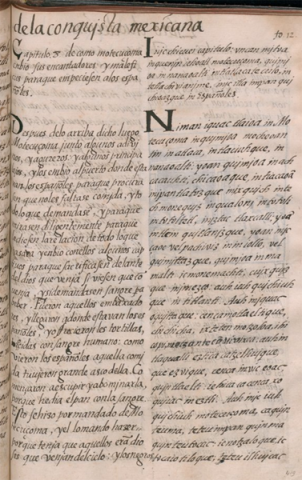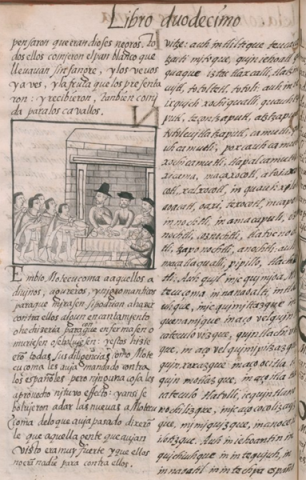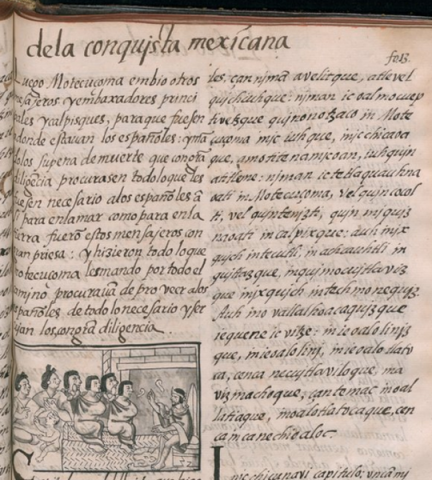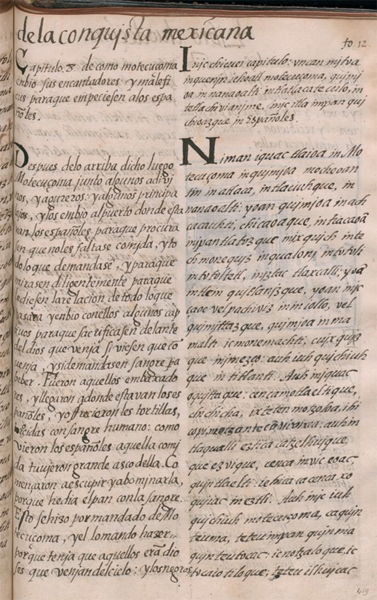 |
[Transcription of the Nahuatl (right-hand column) by James Lockhart:]
[f. 12r.] Inic chicuei capitulo: vncan mitoa in quenin iehoatl motecuçoma, quimioa in nanaoalti in tlatlacateculo, in tetlachivianime, inic itla impan quichioazque in Españoles.
Niman iquac tlaioa in Motecuçoma in quimioa mocheoantin in atlaca, in tlaciuhque, in nanaoalti:* yoan quimioa in achcacauhti, chicaoaque, in tiacaoā in ipantlatozque in ixquich intech monequiz in qualoni in totoliin totoltetl, in iztac tlaxcalli: yoā in tlein quitlanizque,yoan inic ça oc vel pachiviz in iniollo, vel quimittazque, quimioa in mamalti, ic monemachti, cuix quizque inimezço: auh iuh quichiuhque in titlanti.
Auh in iquac oquittaque: cenca motlaeltique chichicha, ixtetenmotzoloa, ihicopi, motzontecōvivixoa: auh in tlaqualli eztica catzelhuique, queezvique, cenca inviceoac, quintlaelti: iehica ca cenca xoquiiac in eztli.
Auh inic iuh quichiuh motecuçoma, ca quinteuma,teteu impan quinma quinteutocac: ic notzaloque, ic tocaiotiloque, teteu ilhuicac
----------
*IN TLACIUHQUE, IN NANAOALTI. The translations for different kinds of shamans and prognosticators are necessarily arbitrary and inexact, because the set of English terms does not offer precise equivalents. In any case, our understanding of the roles among he Nahuas is not very exact, and even when we have a fair notion, it is not clear that different aspects corresponded to different specialists.
|
[Translation of the Nahuatl (right-hand column) by James Lockhart:]
Eighth chapter, where it is said how Moteucçoma sent witches, wizards, and sorcerers* to do something to the Spaniards.
Then at that time Moteucçoma sent out emissaries. Those whom he sent were all bad people, soothsayers and witches. He also sent elders, strong warriors, to see to all [the Spaniards] needed as to food: turkey hens, eggs, white tortillas, and whatever they might request,and to look after them well so that they would be satisfied in every way. He sent captives in case [the Spaniards] should drink their blood. And the emissaries did as indicated.
But when [the Spaniards] saw it, they were made sick to their stomachs, spitting, rubbing their eyelids, blinking, shaking their heads. And [the emissaries]sprinkled blood in the food, they bloodied it, which made their stomachs turn and disgusted them, because of the great stench of the blood. Moteucçoma did this because he took them for gods,considered them gods, worshipped them as gods. They were called and given the name of gods who have come from heaven,
[Translation of the Spanish (left-hand column) by James Lockhart:]
Chapter Eight, of how Moteucçoma sent his enchanters and casters of evil spells to do harm to the Spaniards.
After the above-said, Moteucçoma convoked some diviners and soothsayers, along with some lower leaders, and sent them to the port where the Spaniards were so that they would arrange that they should not lack food or anything they should demand, and should diligently see to it that they report to him everything that was going on. He sent with them some captives to be sacrificed before the god who was coming, if they should deem it fitting and if he should demand blood to drink.
Those envoys went and reached the place where the Spaniards were. They offered them tortillas sprinkled with human blood; when the Spaniards saw that food, it made them very nauseous. They began to spit and detest it, because the bread reeked of blood. This was done by order of Moteucçoma, and he ordered it done because he considered that those were gods who came from heaven, and they thought that the blacks
|
[Translation of the Nahuatl into Spanish by Fr. Bernardino de Sahagún; transcription of the Spanish (left-hand column) by James Lockhart:]
[f. 12r.] Capitulo .8. de como motecuçoma enbio sus encantadores y maleficus para que empreciesen a los españoles.
Despues de lo arriba dicho luego Motecuçoma junto algunos adivinos, y agureros: y algunos principalejos, y los embio al puerto donde estauan los españoles para que procurasen que no les faltase comida, y todo lo que demandasē, y para que mirasen diligentemente para que le diesen la relacion de todo lo que pasava y enbio con ellos algunos del dios que venia si viesen que cōuenia, y si demandasen sangre pa beber.
Fueron aquellos embaxadores, y llegaron a donde estavan los españoles, y offrecieronles tortillas, torcidas con sangre humano, como vieron los españoles aquella comida tuuieron grande asco della. Començaron a escupir y abominarla, porque hedia el pan con la sangre.
Esto se hizo por mandado de Motecuçoma, y el lo mando hazer porque tenia que aquellos erā dioses que venian del cielo: y los negros
|
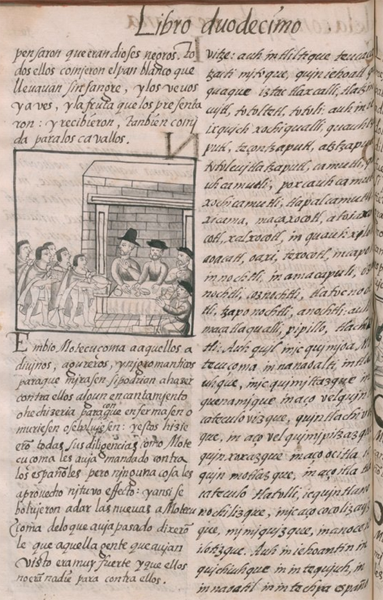 |
[Transcription of the Nahuatl (right-hand column) by James Lockhart:]
[f. 12v.] vitze: auh in tliltiqueteucacatzacti mitoque,
quin iehoatl quiquaque iztac tlaxcalli, tlatzincuitl, totoltetl, totoli, auh in ie ixquich xochiqualli, quauhtzaputl, teçontzaputl, atztzaputl,* totolcuitlatzaputl, camutli, quauhcamutli, poxcauhcamutli xochicamutli, tlapalcamutli, xicama, maçaxocotl, atoiaxocotl, xalxocotl, in quauhxilotl, aoacatl, oaxi, texocotl, in capoli, in nochtli, in amacapuli, iztac nochtli, coznochtli, tlatocnochtli, tzaponochtli, anochtli: auh in maçatlaqualli, pipillo, tlachicaztli:
Auh quil inic quimioa Motecuçoma in nanaoalti, intlaciuhque, inic quimittazque in quenamique in aço vel quintlacateculovizque, quintlachivizque, in aço vel quimipitzazque quinxoxazque in aço oc itla ic quinmotlazque, in aço itla tlacateculotlatolli, ic quintlanonochilizque, inic aço cocolizcuizque, mimiquizque, in anoce ic ilotizque. Auh in iehoantin in quichiuhque in intequiuh, in innaoatil in intechpa españo
----------
*ATZTZAPUTL. For the names of the foods I rely chiefly on Sahagún 1950-1982: 13.22, which has references and some specific botanical names. The terms left in Nahuatl are not understood. The intention of "atztzaputl" is probably "atzatzaputl." See Sahagún 1950-1982: 1.22, n.7.
|
[Translation of the Nahuatl (right-hand column) by James Lockhart:]
and the blacks were called soiled gods.
After that they ate white tortillas, grains of maize, turkey eggs, turkeys, and all the fruits: custard apple, mamey, yellow sapota, black sapota, sweet potato, manioc, white sweet potato, yellow sweet potato, colored sweet potato, jícama, plum, jobo, guava, cuajilote, avocado, acacia [bean], tejocote, American cherry, tuna cactus fruit, mulberry, white cactus fruit, yellow cactus fruit, whitish-red cactus fruit, pitahaya, water pitahaya. And the food for the deer was pipillo and tlachicaztli.
They say that Moteucçoma sent the witches, the rainmakers, to see what [the Spaniards] were like and perhaps be able to enchant them, cast spells on them, to use conjury or the evil eye on them or hurl something else at them, perhaps addressing some words of wizardry to them so that they would take sick, die, or turn back. But when they performed the assignment they had been given concerning the Spaniards,
[Translation of the Spanish (left-hand column) by James Lockhart:]
were black gods.
They all ate the white bread, without blood, that they brought, and the eggs and fowl, and the fruit that they presented to them, and they also received food for the horses.
Moteucçoma sent those diviners, soothsayers, and necromancers to see if they could make some enchantment or bewitchment against them so that they would sicken or die or go back. They used all their procedures against the Spaniards, as Moteucçoma had ordered them, but nothing did them any good or had any effect, so they returned to tell Moteucçoma the news of what had happened. They told him that those people whom they had seen were very strong, and that they were nothing against them. |
[Translation of the Nahuatl into Spanish by Fr. Bernardino de Sahagún; transcription of the Spanish (left-hand column) by James Lockhart:]
[f. 12v.] pensaron que eran dioses negros.
Todos ellos comieron el pan blanco que lleuauan sin sangre, y los veuos y aves, y la fruta que los presentaron, y recibieron, tanbien comida para los cavallos.
[Un dibujo, y luego:] Embio Motecuçoma a aquellos adiuinos, agureros, y nigromanticos para que mirasen si podrian a* hazer contra ellos algun encantamiento o hechizeria para con que enfermasen o muriesen o se boluiesen: y estos hizierō todas sus diligencias como Motecuçoma les auia mandado contra los españoles pero ninguna cosa les aprouecho ni tuvo effecto: y ansi se boluieron a dar las nueuas a Motecuçoma de lo que auia pasado dixerōle que aquella gente que auian visto era muy fuerte y que ellos no erā nadie para contra ellos.
----------
*A. Incorrect and superfluous by the normal rules of Spanish grammar.
|
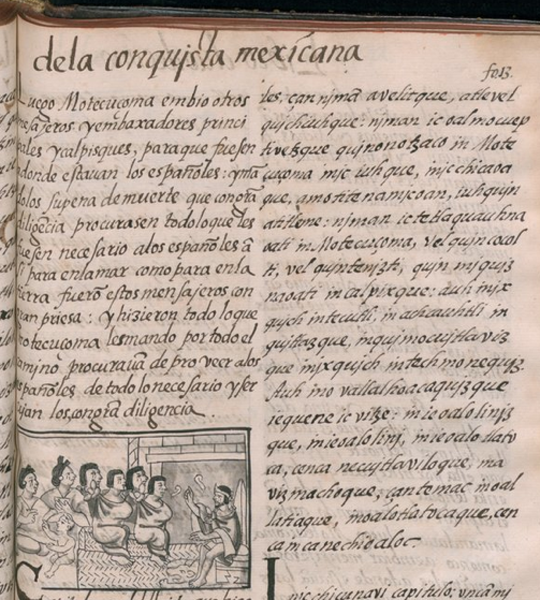 |
[Transcription of the Nahuatl (right-hand column) by James Lockhart:]
[f. 13r.] les, çan nimā avelitque, atle vel quichiuhque: niman ic oalmocueptivetzque quinonotzaco in Motecuçoma inic iuhque, inic chicaoaque, amo titenamicoan, iuhquin atitleme:
niman ic tetlaquauhnaoati in Motecuçoma, vel quin-cocolti, vel quintenizti, quinmiquiznaoati in calpixque: auh in ixquich in tecutli, in achcauhtli in quittazque, inquimocuitlavizque in ixquich intech monequiz. Auh inovallalhoacaquizque iequene ic vitze: in ie oalolinizque, in ie oalolini, in ie oalotlatoca, cenca necuitlaviloque, mavizmachoque, çan temac in oallatiaque, in oalotlatocaque, cenca inca nechioaloc.
|
[Translation of the Nahuatl (right-hand column) by James Lockhart:]
they could do nothing; they had no power at all. Then they quickly returned to tell Moteucçoma what they were like, how strong they were, [saying,] “We are not their match; we are as nothing.”
Then Moteucçoma gave strict orders; he scolded and charged the stewards and all the lords and elders, under pain of death, that they see to and take care of everything [the Spaniards] might need. And when [the Spaniards] came onto dry land and finally started moving in this direction and coming along the road in this direction, they were well cared for and made much of. They were always in the hands of someone as they came progressing; they were very well attended to.
[Translation of the Spanish (left-hand column) by James Lockhart:]
Then Moteucçoma sent other messengers, envoys, leaders, and calpisques, to go where the Spaniards were, ordering them on pain of death that with great diligence they should arrange whatever the Spaniards should need, whether on land or on the sea. These messengers went with great haste and did everything that Moteuccoma ordered them. All along the way they arranged to supply the Spaniards with all they needed and served them with great diligence.
|
[Translation of the Nahuatl into Spanish by Fr. Bernardino de Sahagún; transcription of the Spanish (left-hand column) by James Lockhart:]
[f. 13r.] Luego Motecuçoma embio otros mesajeros y embaxadores principales y calpisques, para que fuesen a donde estauan los españoles: y mādolos su* pena de muerte que con grā diligēcia procurasen todo lo que les fuesen** necesario a los españoles āsi para en la mar como para en la tierra fuerō estos mensajeros con gran priesa: y hizieron todo lo que motecuçoma les mando por todo el camino procurauā de proveer a los españoles de todo lo necesario y seruianlos, con grā diligencia.
----------
*SU. For "so." Henceforth no note will be taken of the frequent cases of u for standard o and vice versa.
**FUESEN. Normal Spanish grammar would demand "fuese."
|
